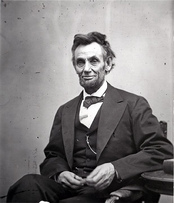 A new drama about the life of Abraham Lincoln and the role that his fourteen years in Spencer County, Indiana, played is being planned for the bicentennial of his birth in 2009.
A new drama about the life of Abraham Lincoln and the role that his fourteen years in Spencer County, Indiana, played is being planned for the bicentennial of his birth in 2009.
Benedict XVI & Israel’s Chief Rabbinate
In the published comments of Pope Benedict to the distinguished representatives of the Chief Rabbinate of
The Church recognizes that the beginnings of her faith are found in the historical divine intervention in the life of the Jewish people and that here our unique relationship has its foundation. The Jewish people, who were chosen as the elected people, communicate to the whole human family, knowledge of and fidelity to the one, unique and true God. Christians gladly acknowledge that their own roots are found in the same self-revelation of God, in which the religious experience of the Jewish people is nourished.
I sit choir with a group of monks and other Christians praying the Scritpures on a daily basis and I’m coming to understand (judge, evaluate) more and more the connections, i.e., the reality that exists between Jewish and Catholic theology/liturgy. This is especially true in the Psalms but no less with the daily readings from Pentateuch and the Prophets. One of the books I am re-reading selections from these days is Father Richard Veras’ book, Jesus of Israel: Finding Christ in the Old Testament (Servant Books, 2007), who speaks about the promises made to us down through the ages by the Lord, promises of the hundredfold, promises of life, liberation and communion with the Lord as they are revealed in the sacred Scriptures.
For what it’s worth, Pope Benedict said the following 19 years ago when he was still known as Joseph Ratzinger, the CDF Prefect:
Abraham, father of the people of Israel, father of faith, thus become the source of blessing, for in him all the families of the earth shall call themselves blessed. The task of the Chosen People is, therefore, to make a gift of their God – the one true God – to every other people; in reality, as Christians we are the inheritors of their faith in the one God. Our gratitude, therefore, must be extended to our Jewish brothers and sisters who, despite the hardships of their own history, have held on to faith in this God right up to the present, and who witness to it in the sight of those peoples who, lacking knowledge of the one God, dwell in darkness and in the shadow of death.
Down through the history of Christianity, already-strained relations deteriorated further, even giving birth in many cases to anti-Jewish attitudes, which throughout history have led to deplorable acts of violence. Even if the most recent, loathsome experience of the Shoah was perpetrated in the name of an anti-Christian ideology, which tried to strike the Christian faith at its Abrahamic roots in the people of Israel it cannot be denied that a certain insufficient resistance to its atrocity on the part of Christians can be explained by an inherited anti-Judaism present in the hearts of not a few Christians.
Perhaps it is precisely because of this latest tragedy that a new vision of the relationship between the Church and
It is evident that, as Christians, our dialogue with the Jews is situated on a different level than that in which we engage with other religions. The faith witnessed to by the Jewish Bible (the Old Testament for Christians) is not merely another religion to us, but is the foundation of our own faith. Therefore, Christians – and today increasingly in collaboration with their Jewish sisters and brothers – read and attentively study these books of Sacred Scripture, as a part of their common heritage. (Excerpts from Cardinal Ratzinger’s “The Heritage of Abraham: The Gift of Christmas,” L’Osservatore Romano,
In light of all of this public speaking I think today’s allocution by the Pope reveals a consistent line of teaching not only by a man with a keen intellect and a profound faith in the Divinity but also consistent with magisterial teaching of the Holy See. Hence, I don’t think that Benedict’s thoughts today are not throw away lines to ease tensions, real or imaginary between the Catholic Church and the Jewish leadership. Moreover, I also don’t think it’s a political ploy before a papal visit to the
My sense is that the Pope is rather genuine in his judgment that Christians and Jews need each other because each provide an interpretative key in self-identity and the theological journey we both make toward our destiny. For Christians we need to grasp what is being done (the action) and what is said (the content) in order to take seriously our own faith in Jesus Christ as Lord, Savior and Brother. So no, these remarks today aren’t lines denoting mere policy, mechanical ways to engage a touchy politic serving a group’s interests. These lines reflect not only this pontiff’s thinking but the Church’s self-understanding and theological grounding. Nostra Aetate (1965) and Dabru Emet (2000) like documents demonstrate a commitment from which to work with each other in an effort to know, love and serve the Almighty while coming to understand a common theological and liturgical history. Consequently, Jews and Catholics should not only work on projects that serve the common good but also work for greater understanding in the process of dialogue leading to the eternal.
Some will say that the Pope made a nice gesture by speaking honestly with the Jews. But that would be yet another example of a tyranny of the “nice,” and we don’t need more “nice.” What we need is true honesty, faith and reason before reality. What I believe the Pope is indicating to us is the profound need because it is reasonable as people of faith to draw deeply from the common faith experience in order to discern our relationship with the Lord and to foster a deeper communion between Jews and Christians. We need to understand the reality that’s in front of us, the gift of friendship in faith with others on a similar path to destiny.
Benedict to the World’s Bishops on Archbishop Lefebvre
Novena to St. Benedict
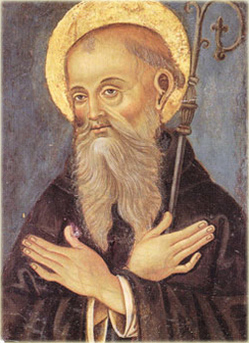 O Glorious St. Benedict, sublime model of all virtues, pure vessel of God’s grace! Behold me, humbly kneeling at thy feet. I implore thy loving heart to pray for me before the throne of God. To thee I have recourse in all the dangers which daily surround me. Shield me against my enemies, inspire me to imitate thee in all things. May thy blessings be with me always, so that I may shun whatever God forbids and avoid the occasions of sin.
O Glorious St. Benedict, sublime model of all virtues, pure vessel of God’s grace! Behold me, humbly kneeling at thy feet. I implore thy loving heart to pray for me before the throne of God. To thee I have recourse in all the dangers which daily surround me. Shield me against my enemies, inspire me to imitate thee in all things. May thy blessings be with me always, so that I may shun whatever God forbids and avoid the occasions of sin.
Graciously obtain for me from God those favors and graces of which I stand so much in need, in the trials, miseries and afflictions of life. Thy heart was always so full of love, compassion, and mercy towards those who were afflicted or troubled in any way. Thou didst never dismiss without consolation and assistance anyone who had recourse to thee. I therefore invoke thy powerful intercession in the confident hope that thou will hear my prayers and obtain for me the special grace and favor I so earnestly implore (mention it), if it be for the greater glory of God and the welfare of my soul.
Timothy M. Dolan: priesthood could be spiritually demanding, emotionally fulfilling, intellectually rigorous — AND FUN!
‘Larger Than Life’ Figure Dolan Taught What Priesthood Means
by Father Raymond J. de Souza
The garrulous Timothy Michael Dolan, preacher and raconteur extraordinaire, chooses his
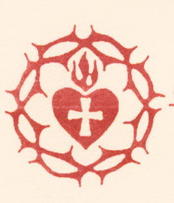 words carefully. And when ordained a bishop in 2001 in
words carefully. And when ordained a bishop in 2001 in
He then went on to express his joy in the priesthood, his love for the Church, his delight in his parishioners — and also brought the house down with his ever-ready wit. The newly appointed archbishop of
Raised in a Catholic home in Ballwin, Mo., young Tim learned the faith from parents who never missed Mass — but also looked forward to cold beer and barbecues on Sunday afternoon. That formation came to the fore when Archbishop Dolan remarked that, among other things he looked forward to in
 Critics of Archbishop Dolan consider the backslapping, guffawing, cigar-smoking, beer-drinking prelate an old Irish neighborhood pol, eager to lead the St. Patrick’s Day parade but not sophisticated in the life of the mind or the life of the spirit. A faithful son of
Critics of Archbishop Dolan consider the backslapping, guffawing, cigar-smoking, beer-drinking prelate an old Irish neighborhood pol, eager to lead the St. Patrick’s Day parade but not sophisticated in the life of the mind or the life of the spirit. A faithful son of
Father Dolan served as rector of the American seminary in
We were the privileged ones who regularly heard him preach — and he is a superlative preacher — not only during Mass, but at the memorable rector’s conferences that were later collected and published to great acclaim under the title Priests for the Third Millennium.
The printed page cannot capture fully his enthusiasm — and is excised of many of the in-house comments that provoked laughter all round — no one enjoys his jokes more than he does. Yet, the conferences are evidence of a fine mind at work, with a facility for bringing the Church’s perennial wisdom to current challenges. A historian by training, Msgr. Dolan taught a course on
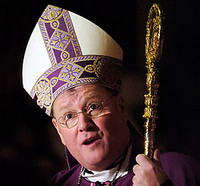 As a seminary rector, Msgr. Dolan lived the “both/and” intuition that is at the heart of the Catholic approach: both popular piety and liturgical prayer; both traditional music and contemporary styles of worship; both adherence to a rule and an encouragement of creative initiative; both theological orthodoxy and a cultivated life of the mind; both serious formation and fraternal good times; and, yes, both the pasta and the main course at pranzo. It was from Msgr. Dolan that I learned that the priesthood could be spiritually demanding, emotionally fulfilling, intellectually rigorous — and fun!
As a seminary rector, Msgr. Dolan lived the “both/and” intuition that is at the heart of the Catholic approach: both popular piety and liturgical prayer; both traditional music and contemporary styles of worship; both adherence to a rule and an encouragement of creative initiative; both theological orthodoxy and a cultivated life of the mind; both serious formation and fraternal good times; and, yes, both the pasta and the main course at pranzo. It was from Msgr. Dolan that I learned that the priesthood could be spiritually demanding, emotionally fulfilling, intellectually rigorous — and fun!
Before arriving at the NAC, I knew that the priesthood was a life of noble service, but looked ahead to a life of duty rather than looking forward to an enjoyable life. It has been repeated so often that it has become a caricature, but the first time I ever saw the rector, rosary in one hand and cigar in the other, I knew that I had found a compelling model of the priesthood.
My fellow seminarian at the time, Father Roger Landry, editor of the Diocese of Fall River, Mass., newspaper, The Anchor, has commented that Archbishop Dolan is a needed corrective to the perception that the Catholic faith is a necessary burden that strips the joy out of life. “If there’s any priest in
The appointment itself showed Archbishop Dolan at his best.
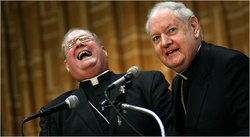 Not so much the bonhomie — though only he could have slapped Cardinal Edward Egan on the back. It surely has been some time since the cardinalatial back had been so heartily thumped, but, then, Dolan has rarely encountered a back he considered unslappable. The real Dolanesque touch was to use the questions about the appointment as a teaching moment about the liberating potential of obedience.
Not so much the bonhomie — though only he could have slapped Cardinal Edward Egan on the back. It surely has been some time since the cardinalatial back had been so heartily thumped, but, then, Dolan has rarely encountered a back he considered unslappable. The real Dolanesque touch was to use the questions about the appointment as a teaching moment about the liberating potential of obedience.
“I wasn’t asked,” he said simply of the message from the apostolic nuncio. He was told of the Holy Father’s decision, and, therefore, the path was clear. Obedience can be liberating. It’s a Christian truth, but a disputed one, and something that many of those watching in
“My own spiritual director believes that it is precisely in obedience — not in celibacy, strangely enough — that the priest of today is most countercultural,” Dolan said. “This culture of denigrating obedience is particularly obvious in our beloved
When Archbishop Dolan arrives in
Father Raymond J. de Souza is a priest of the Archdiocese of Kingston (
Human dignity leads to a free society: get on board with the World Youth Alliance TODAY
Are you a member of the World Youth Alliance? Do you believe that young people can change our current culture to one that is based on the dignity of the human person and you want to help us share the experience of human dignity and solidarity with more young people?
Visit the WYA website today, and share it with your friends!
It’s about dignity!
The World Youth Alliance is composed of young men and women from every part of the world. In cooperation with other organs of the international community, primarily the United Nations and the European Union, the World Youth Alliance is committed to building free and just societies through a culture of life. That culture affirms the inalienable dignity of the person, defends the intrinsic right to life, nurtures the family, and fosters a social climate favorable to integral development, solidarity, and mutual respect.
We recognize that the intrinsic dignity of the person is the foundation of every human right. We believe this dignity is independent of any individual condition and that no human community can grant or rescind that dignity.
We are convinced that the intrinsic dignity possessed by every human being from conception to natural death is the foundation of everyone’s right to life. We believe that this inalienable right to life is the basis of a free and just society and we believe that society through law and culture has an obligation to protect the dignity of the person and thus protect the right to life.
We affirm that the fundamental unit of human society is the family, where men and women learn to live in genuine freedom and solidarity, and where individuals are equipped to fulfill their social obligations. We believe that the political community at the local, national and international level is obliged to protect and nurture the family.
|
We believe that the authentic development of society can occur only in a culture that fosters integral human development – characterized by physical, spiritual, mental, and emotional growth, in a climate of respect for the human person and the family. We invite all those who share these convictions to join us in affirming them and give them effect in public life at all levels. |
|
Evolution congress in Rome draws theologians & scientists
Observing the 200th anniversary of Charles Darwin’s birth, the Vatican’s Council for Culture, the Gregorian Univ. and the Univ. of Notre Dame gather a diverse group of intellectuals to discuss the matrix of faith and science, especially evolution. Watch the video clip.
A story from before the congress published by The Pew Forum on Religion and Public Life: Religion News, is informative.
Encountering Christ broadens the person
The Pope pointed out that the example of the saints “shows that when a person encounters Christ, he is not enclosed in himself, but is open to the needs of others and, in every realm of society, puts the good of all before his own interests.”
CT bill 1098 killed (for now)
This evening’s report on killing of the CT bill 1098 by Catholic News Service:
Bill giving laity control of parish finances killed in Connecticut
HARTFORD, Conn. (CNS) — At the request of its proponents, a bill that would have given laypeople financial control of their parishes in Connecticut has been withdrawn and is dead for this legislative session. In a joint statement March 10, the co-chairmen of the Connecticut Legislature’s Judiciary Committee, Sen. Andrew J. McDonald of Stamford and Rep. Michael Lawlor of East Haven, announced the cancellation of a scheduled March 11 hearing on the controversial bill. There was no immediate comment on the bill’s demise from the Catholic bishops of Connecticut, who had strongly opposed the legislation and urged Catholics to turn out at the hearing in large numbers. “At the request of the proponents who are advocating this legislation, we have decided to cancel the public hearing for tomorrow, table any further consideration of this bill for the duration of this session, and ask the attorney general his opinion regarding the constitutionality of the existing law,” said McDonald and Lawlor, both Democrats and Catholics. “It would serve no useful purpose to have a conversation about changing the laws that govern existing Roman Catholic corporations until we know if any of these existing laws are constitutional,” they said.
For the moment the bill is off the table. Good. Prayers answered. BUT it’s only a matter of time before this initiative (or something similar) is reintroduced –with sharper teeth– which will shake the dander of faithful Catholics who hold firmly to Catholic teaching. Some will see this threat as lacking merit, but heterodox will pull something else to threaten the security of free exercise of religion. Sorry to say, fellow Nutmegers have tried to disrupt the unity of the Church. Senator Michael McLachlan this afternoon after announcing the tabling of the bill, “Now they [Andrew McDonald and Michael Lawler] want the Catholic Church to defend the laws on the books since 1866!” THE fight is not over…by a long shot.
Saint Michael, pray for us!!!
CT’s Legislative Bill 1098 attacks Religious Freedom
The editors of Headline Bistro, the headline service of the Knights Columbus, posted an analysis of the current situation regarding legislative bill 1098 introduced by two
Keeping up-to-date:
Carl Anderson’s Op-Ed piece in the Stamford Advocate “Shredding the First Amendment in the
“Religious Freedom Under Attack in
The New Haven Register’s March 9th article on the subject
The bill’s chief proponent, Tom Gallagher, has an Op-Ed piece in the National Catholic Reporter.